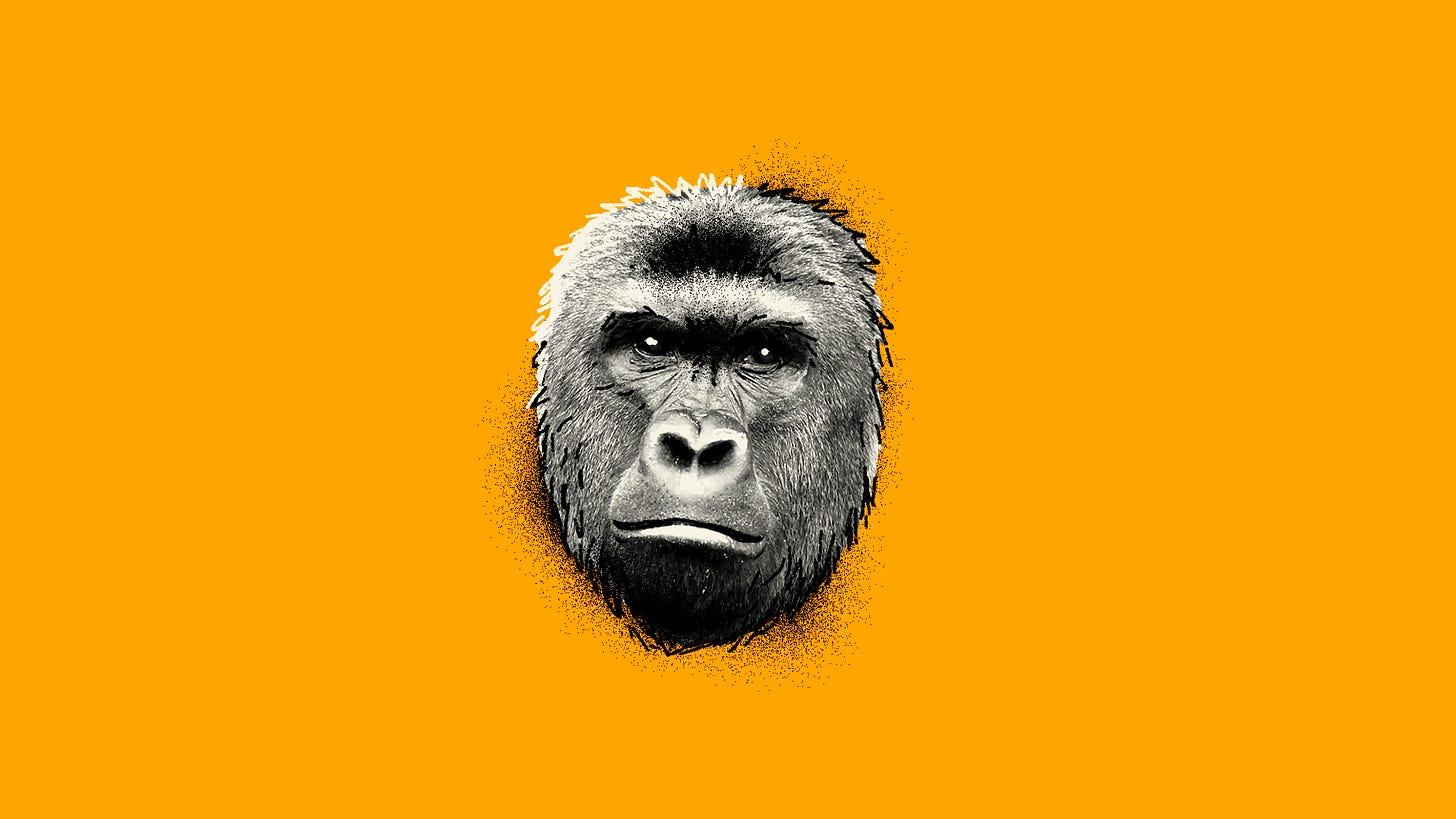Memes are cultural ephemera that live on the internet, but in October 2021 one stepped out of cyberspace and took physical form in Lower Manhattan. It was a 7-foot-tall bronze statue of an ape. Or more specifically, it was a western lowland gorilla named Harambe. It appeared opposite the Charging Bull statue on Wall Street, proud and defiant-looking. As an added touch suggesting the gorilla’s dominance, 10,000 bananas were laid at the bovine’s feet.
The group that commissioned the piece, Sapien.Network, said the gorilla was intended to “highlight how out of touch Wall Street has become to the needs of everyday people and to challenge the Street’s uncompassionate capitalism.” Yet that explanation was a bit out of step with the creature’s actual origins.
The online evolution of Harambe wasn’t spurred so much by anti-capitalist sentiment as it was by a new millennial-led breed of capitalism — one that rejected institutions, establishments, credentials…and sometimes common sense. This ethos powered cryptocurrency’s sudden post-pandemic ubiquity, accelerated the disintegration of mainstream media, and left an indelible mark on the U.S. financial system.
Here’s how all that started: Harambe, the flesh-and-blood one, suffered a tragic fate at human hands in May 2016, when a 3-year-old boy climbed into his enclosure at the Cincinnati Zoo. Ignoring signals from his handlers to stay back, the curious ape approached the child and picked him up. Onlookers screamed in horror, and Harambe began behaving — in human eyes — erratically as he carried the boy. Fearing for the child’s safety, zookeepers shot and killed the gorilla. (The boy fortunately escaped the ordeal with only minor injuries.)
A cell phone video capturing the events swiftly went viral, sparking global outrage on behalf of Harambe. Animal rights activists staged protests and candlelight vigils; there were calls for investigations into the zoo’s safety protocols and the child’s parents; and celebrities, including renowned primate researcher Jane Goodall, weighed in on things.
Through the explosion of social media chatter, things got weirder. First, the gorilla morphed into a punchline about performative indignation. Then the irony double-backed on itself: Harambe was embraced sincerely as a mascot by amateur traders who congregated on a Reddit forum called WallStreetBets. The traders, who swapped stock tips as well as gleefully offensive jokes and memes, started to call themselves “apes,” partly in homage to Harambe.
In January 2021, something amazing and utterly ridiculous happened, catapulting WallStreetBets’ favorite gorilla into a populist symbol. Members of the group started buying shares of GameStop, a moribund brick-and-mortar video game retailer whose best days were long behind it. “Apes together strong,” they trumpeted, referencing a line from the movie War for the Planet of the Apes (again, played off the Harambe theme of the Reddit). Working together, they powered an unthinkable rally in GameStop’s stock, causing its price to shoot upward by more than 1,700% in just a few days.
By doing that, they cost hedge funds and other institutional investors billions of dollars: those investors had “shorted” GameStop’s stock. Shorting a stock essentially means placing a bet that the share price would fall — which, in the case of GameStop had seemed a more rational prospect.
What shorting actually entails is borrowing stock from someone for a period of time, selling the stock you don’t actually own at a high price and then buying it back (to return to the lender) at a lower price; profit is made on the difference. When the prices rise instead of fall, however, a short seller can end up deeply in the red, especially when the price rockets up 1,700%.
The Redditors pulled off their shocking upset largely through a low-cost brokerage app that promised to “democratize finance.” Appropriately enough, the app was named “Robinhood,”and it was founded by iconoclastic Bulgarian-American millennial Vlad Tenev, who rose from nothing to become a billionaire. His now-publicly traded company soared to a market capitalization of over $30 billion in 2021. (As of writing this in 2022, however, it is on a downward slide, and is now worth a mere $8.5 billion.)
While they took pleasure in afflicting elite financial professionals, the Redditors did not quite fit the heroic concept espoused by Sapien.Network of “putting the needs and welfare of human beings first.” These were snarky, shitposting 20-and-30-somethings who relished their lowly status, and joked about how they all lived in their parents’ basements and subsisted on chicken tenders.
They did not band together for the greater good, or even to achieve respectability. They were more like a crew of pirates or gamblers, referring to themselves frequently as “degenerates” (among more offensive monikers). Instead of following carefully-planned strategies, they plunged headlong into foolhardy positions, clinging to a motto: YOLO, or You Only Live Once.
In that regard, they were openly inspired by a spiritual figure of sorts, a human “martyr” of self-destruction (and a former WallStreetBets moderator). This 30-something individual had also come from humble beginnings: He was a child of Albanian immigrants in Brooklyn who had worked as janitors.
Through his blisteringly meteoric trajectory, he YOLO’ed his way into attaining vast wealth, then lost most of it. He made risky and rash business decisions, became the most hated personality on the internet, got kicked off of almost all social media platforms, and ultimately ended up with a lengthy prison sentence for a securities fraud scheme whose most damaged victim was himself.
Like Harambe, his name and face were known far and wide. But unlike Harambe, he did not generate sympathy from the masses, nor was he ever labeled as a creature of “compassionate capitalism.” It would be much more accurate to say that the masses despised him, and he was widely considered to be a walking manifestation of greed.
But the Redditors on WallStreetBets still adored him. They wrote him hundreds of fan letters during his incarceration and, despite the PR ramifications of saying anything remotely positive about this individual, the founder of WallStreetBets Jamie Rogozinski publicly lauded him and said he was “valuable” to the online community.
His name was Martin Shkreli.
As CEO of a small drug company Turing Pharmaceuticals, he bought the rights in 2015 to a medication which treated toxoplasmosis, a disease caused by a parasite people tend to encounter in cat poop. Most of us have immune systems that are well-armed against the bug, so we don’t get sick. But people with HIV, cancer patients, or unborn babies can get seriously ill or die from the disease. After buying the drug, Daraprim, Martin jacked up the price by a bracing 5,000 percent.
Although he insisted patients weren’t hurt by the price increase because insurance picked up the tab, doctors and health care advocacy groups loudly disputed those claims and condemned him. His defiant reaction to their criticism only amplified it, and unleashed fury from every corner of the internet.
Writers for the BBC questioned whether he was the “most hated man in America” in a bold headline. (The date on the piece was changed when it was updated on Aug. 4, 2017, but the Internet Archive puts the original publication at Sept. 23, 2015.) The expression stuck, and was repeated by numerous media outlets, without the question mark, as fact.
But before his pharmaceutical company days, he had a brief and tumultuous period as a hedge fund manager, when he lost his investors’ funds multiple times over on bad bets (only to later make tens of millions of dollars for himself with more successful trades). And less than six months after he incited public fury over the drug price debacle, his messy hedge fund past caught up with him. He was arrested and charged with securities fraud for lying to his investors about his track record and how he managed their money.
Rather than stay quiet, he amped up his infamy by purchasing a single-copy album by the Wu-Tang Clan, Once Upon a Time in Shaolin, for $2 million (which was later forfeited to the government and sold to a crypto collective for $4 million). He also trolled journalists, celebrities and politicians with wild abandon — at least until he was first suspended from Twitter for sexual harassment and then sent to prison after his conviction on the securities charges.
Even while locked up, he didn’t stay out of the headlines. In 2019, the Wall Street Journal published an article claiming he was still running his former drug firm, Turing Pharmaceuticals, from prison with a contraband cell phone.
The story gave the Federal Trade Commission ammunition it needed to sue Shkreli, accuse him of price manipulation from behind bars, and ultimately win a ruling requiring him to fork over $65 million in profits and banning him from the pharmaceutical industry for life.
When the GameStop madness happened, Martin sent me an email from the closed-circuit, monitored prison email system. “LOL this thing is so nuts,” he told me. “You can let the world know, if you’d like, that I’d be willing to testify to the Congressional committee on the Reddit, GameStop, etc., situation.”
I tweeted a screenshot of the email, and a reporter for the New York Post wrote a story about the missive. The young reporter working on the piece called me on my cell phone one evening while I was in my living room in Harlem, entertaining my brother and his husband. “It’s the Post,” I told them over my shoulder, and they giggled.
Indeed, there were eventually Congressional hearings on GameStop, Reddit and Robinhood, although Martin was not called upon to participate. Lawmakers did ask Keith Gill, a young financial analyst who went by the online name “Roaring Kitty” and helped lead the GameStop maneuvering, and Robinhood founder Tenev to testify. Both for his appearance and his devil-may-care demeanor, Tenev earned many comparisons to Martin.

The U.S. Securities and Exchange Commission also launched probes into the GameStop events and wrung its hands over the “gamification” of the stock market because, it seemed, the “wrong” people were benefitting from the enterprise.
The SEC, state attorneys general and other enforcement agencies brought various legal actions against Robinhood, but none drew much blood. The trading behmoth simply paid multimillion-dollar fines like traffic tickets and kept growing.
Amid the Gamestop controversy, public outcry rose over Robinhood’s possible contributions to the death of a 20-year-old customer, Alex Kearns. Kearns had racked up a $730,000 negative balance on the app, likely through options trading, and killed himself in June 2020. His family filed a lawsuit against the app in February 2021.
This, too, was barely a speed bump for Robinhood. The company paid a settlement to Kearns’ family and Tenev publicly apologized to them during the GameStop-related Congressional hearing."The passing of Mr. Kearns was deeply troubling to me and to the entire company,” Tenev said. The narrative moved on.
Despite the horrifying tragedy of Kearns’ death, many of the rapacious young day traders at the center of the phenomenon did not seem to want a regulator’s paternalistic oversight. Some who had lost money in the GameStop frenzy went out of their way to appear unbruised by the experience. A handful of them, for instance, formed their own subreddit, GMEbagholdersclub, where they made self-deprecating jokes about their predicament.
Where did this uprising of “degenerates” come from? And how could there be so many of them? And could they be contained, neutered, or at least brought into the fold of the traditional (and regulated) financial establishment? No one seemed to be able to answer those questions.














